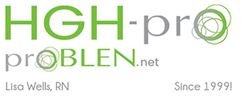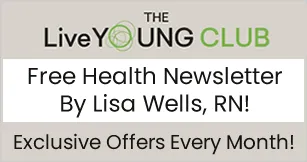Can HGH Decrease Menopausal Symptoms?
By Lisa Wells, RN

I have many times been asked whether growth hormone therapy can help the symptoms of menopause. Hopefully this article will help to answer some questions about menopause and HGH for the women who are considering it.
Menopause is a direct result of low hormones. As women age the hormones that are responsible for youth and health decline. These hormones include human growth hormone, the estrogens, progesterone, testosterone, DHEA, pregnenolone, and others.
It is well known that menopause is related to the decrease in estrogen and progesterone, but the other hormones also play a role, including testosterone.
Those in anti-aging medicine understand that all hormones of the body are connected. When one hormone is low or imbalanced it may affect other hormones.
For the most comprehensive anti-aging therapy we should address all the hormones that decrease with age.
Since human growth hormone is a major rejuvenation hormone when we restore it to a more youthful and healthy level it can also positively affect other hormones.
HGH may help to decrease some of the symptoms of menopause. For instance, improving growth hormone helps to increase libido and sexual function. In fact, if a couple seems to no longer be as interested in sex as before and one of them decides to take HGH therapy their partner may also wish to consider it. The reason is because the one having HGH therapy will probably become more interested in sex.
We have even heard reports from clients in their 70's stating they are enjoying sex again for the first time in years while taking our products.
Depending on how low a woman's estradiol, progesterone, and testosterone levels are she may need more than just growth hormone therapy.
I recommend all women with menopausal symptoms have their hormone levels checked and consult their private healthcare provider about safely optimizing those hormones.
For those who do not want or need to take full hormone replacement therapy we offer homeopathic products to address these important hormones.
Questions and Answers About Growth Hormone and Menopause
Question: I just started having some mild hot flashes after taking the HGH Plus IGF-1 & IGF-2 product for just over a week. Could this mean that my hormones are doing SOMETHING, perhaps recharging and will even out eventually?
Answer: I have had other women tell me the same thing, and it should be a good thing. Since it is happening after taking the product for only one week it appears that your body is very responsive to the product.
One client told me that she had awful menopause-like symptoms a few months earlier, and when she started with our product some of those same symptoms returned for a short time, until her female hormones improved and leveled off again. She told me it was as if her body was moving back in time, back through the symptoms, and then back to the point where her hormones were balanced and her symptoms subsided.
Hopefully your symptoms won't become too strong and won't last very long. The fact that you are already experiencing what appears to be a change in your hormone levels is a positive sign that more benefits should be forthcoming.
Question: I went through menopause some years back. If I start using HGH will I end up going back through my menstrual cycle all over again?
Answer: Our product will not cause you to begin ovulating again. Even our EstroPro product would not cause you to menstruate again after being in menopause for years.
Because restoring growth hormone can have a positive effect on other hormones once your HGH has improved it might possibly help to balance your female hormones slightly, and during this change you might possibly see a small amount of temporary spotting as your hormones improve and become balanced.
The prescription high-dose replacement of estradiol and progesterone with rhythmic dosing that is used in therapies such as the Wiley Protocol can cause your uterus to build up tissue in a monthly cycle. Such therapies can cause cyclic menstrual bleeding because the dose of progesterone decreases to allow the uterus to clear that tissue out, however, there shouldn't be any ovulation for women who have been menopausal for years.
Question: I'm interested in your HGH Plus IGF-1 & IGF-2 and EstroPro Combo for my menopausal problems (hot flashes/night sweats/low libido) but I have a blood disorder and my doctor is against any hormone replacement therapies that cause additional blood clotting. Could you advise me on what kind of (plant or other) hormones your products use?
Answer: It is good that your doctor is concerned about you taking prescription estrogen, especially Premarin, since it is known to increase the risk of blood clots.
Our EstroPro product does not contain Premarin, it contains bioidentical estriol and bioidentical estradiol, both in homeopathic form, so it is much safer than prescription hormone replacement therapy.
Our product contains bioidentical estradiol, estriol, and progesterone which are all sourced from the wild Mexican yam. Our HGH Plus product contains recombinant HGH, the same that is used in the injections. Our products work by providing a small amount of these hormones in safe homeopathic form and they also help the body to make more of its own hormones.
In my opinion, our products would be a safe and hopefully effective alternative for you. However, I must recommend you consult your doctor about possibly trying our products.
Most MD's are not trained in homeopathic medicine and so they may not believe in its effectiveness, however, most do know that homeopathic medicine is considered safe. Be sure to tell your doctor that our products are FDA registered over-the-counter homeopathic products.
Additional Reading
Hormones That Decrease With Age and Your Options
Can Women Receive Estrogen and Progesterone Benefits Without the Risks?
A List of Health Articles by Lisa Wells, RN
Bibliography
Writing Group for the Women's Health Initiative Investigators. Risks and Benefits of Estrogen Plus Progestin in Healthy Postmenopausal Women: Principal Results From the Women's Health Initiative Randomized Controlled Trial. JAMA. 2002;288(3):321-333. doi:10.1001/jama.288.3.321
PLEASE NOTE: The information provided is not meant to be medical advice. Please consult your private healthcare provider.



